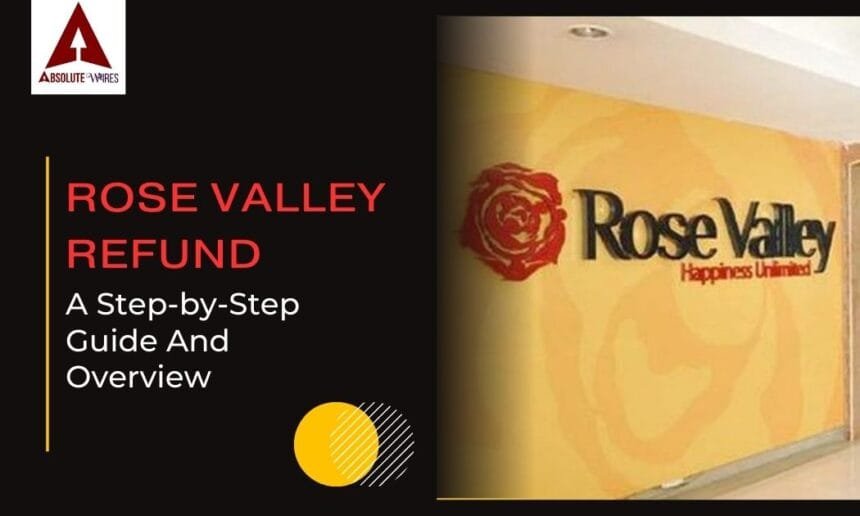The once-thriving Rose Valley Group, with diversified businesses, is now the hub of one of India’s biggest financial scams. Investors who had invested their hard-earned money in Rose Valley schemes have been left in a state of utter turmoil due to fraud allegations. Since then, it has been a long and tedious journey to pursue the refund for these investors. In all of this, this piece offers every detail about the procedure that is followed in issuing the Rose Valley refund; thereby, it helps those involved as investors in navigating what proves to be a real process.
Rose Valley Scandal: Background and Overview
The Rise and Fall of Rose Valley
The Rose Valley Group began as an emerging venture in the early 1990s and fast-tracked its expansion into real estate, hotels, media, and all kinds of businesses. Its schemes for investment had made a lot of promise about generating high returns that really appealed to small investors; however, these eventually went to be exposed as schemes. The whole scheme operation came under scrutiny later.
Accusation of a Ponzi Scheme
Similar to the notorious Saradha scam, Rose Valley’s investment schemes were declared illegal because the authorities realised that it carried the hallmark of a Ponzi scheme. Money from newer investors was allegedly used to pay the older ones, and so, the financial black hole was left with many investors who received no returns whatsoever.
The Legal Battle: Where Things Stand
- Initial Investigations and Arrests: The SEBI intervened in the matter in 2013 to further the investigation. Arrests of the Chairman and other leaders of the group and freezing of assets took place across various states. Assets, owned by the state, will be the basic source for refunds to victims from this fund.
- Court Proceedings and SEBI’s Role: Cases relating to the fraudulent activities of Rose Valley had reached various courts, including the Supreme Court. SEBI and the Enforcement Directorate had framed asset seizure, prosecution, and recovery plans. But long and complicated legal procedures went on with new barriers and hurdles coming up from time to time.
Asset Seizure and Fund Recovery
- Types of Seized Assets: Most of the assets in Rose Valley were confiscated, comprising luxury hotels, real estate, and bank accounts. These will be liquidated, but it is cumbersome due to claims to ownership, litigation, and valuation to raise money to pay back to investors.
- Current Liquidation Situation: Currently, committees assigned by the government are handling the liquidation of the assets. There is a small delay, but the government is pushing forward to get the best possible recovery value for the investors.
Eligibility for Refund under Rose Valley Scheme
- Eligibility Conditions: Those investors who have invested in the schemes before the scam was exposed will be eligible for refund under Rose Valley scheme. Yet, there can be some varying eligibility conditions depending upon the investment amount, type of schemes, and availability of proofs related to investment.
- Significance of Document: There are required documents that investors need to present, which include original investment certificates or receipts. Such documents are crucial for verifying and proving claims and require that all records of investments are held by investors.
Step-by-Step Guide for Claiming Your Rose Valley Refund
Preparation of Needed Documents
- All the necessary documents must be in hand. These include:
- Investment certificates or receipts
- Aadhaar and PAN card
- Bank details for the refund process
Refund Application
- This is available on the website and local authorities. To avoid misinformation, it would be best to visit the website of SEBI or go to local SEBI offices. Application could be online or by visiting personally.
Checking Your Claim
- SEBI and committees which are designated will look at each claim to establish the validity of the same. If they require some further documentation, the applicant is expected to respond accordingly within the time frame in order not to delay things.
Processing Issues and Delay
- Administrative Issues: With so many cases as well as the complexity of the Rose Valley case, the processing stage has been plagued by administrative issues that have slowly dragged down processing.
- Legal Obstacles and Ownership Row: Ownership disputes over property and third-party claims did not help. Cases in courts regarding ownership rights of assets are also causing delay before the refund amount could be distributed.
What investors can do in the meantime?
- Staying informed: Investors should keep themselves updated from authentic sources, which may include the SEBI website, news outlets, and verified social media.
- Investor Support Groups: Many investor support groups and forums can share experiences, provide mutual support, and keep people informed of the latest updates. There are many of them on the internet that could help investors in the refund process as well.
- Consulting Lawyers: Look for legal professionals dealing with financial fraud cases, as the investor will be advised on how to get back his money in the right manner.
Role of government assistance to victims:
- Government measures for asset recovery: The Indian government has taken various steps to ensure that the victims of the Rose Valley scam get justice. ED has been actively involved in identifying and seizing assets, and special funds may be allocated to expedite the refund process.
- Policy Changes for Investor Protection: Triggers for policy change have been Rose Valley and other frauds. SEBI has made rules much more stringent for investment companies so that small investors do not face such frauds, and the authorities are enhancing vigilance to prevent such happenings.
Future of Rose Valley Refund Process
- Changes in Future Financial Rules: The Rose Valley case has underlined the need for better financial regulations. SEBI and other regulatory bodies will have to bring in strict policies that would prevent such frauds in the future.
- Possibility of Compensation Funds: Along with asset-based refunds, government-backed compensation funds for affected investors are also a possibility. Though such measures are yet to be confirmed, the discussions that are going on provide a glimmer of hope.
- Future Prospects for the Affected Investors: Although the refund process is not yet over, at least the last changes and updates indicate a much simplified process in the near future. Investors are requested to keep themselves updated and wait for results as authorities work towards amicable resolution.
Conclusion
The refund process of Rose Valley has been a long and complicated journey with the ups and downs of administrative obstacles, legal disputes, and litigation. Although progress is extremely slow, there is light at the end of the tunnel as authorities are active in the liquidation process of assets and verification of claims. Being aware, getting the necessary documents prepared and consulting lawyers may be one of the best options which can increase the chance for a refund for the investors. Though the Rose Valley scandal has been more like a cautionary tale, the determination of the investors portrays the need for vigilance that regulators must have in a financial market.
FAQs
The duration of refund would depend upon the liquidation of the assets and judicial procedures. In this case, owing to its complicated nature, no time-bound refund could be assured.
There are alternative processes also. In genuine cases, proof may be obtained after appropriate authentication.
This will also depend on the extent and the nature of funds that arises from the liquidation of assets. So far now, maximum recovery may occur, but partial refunds may also come as far as assets that are available are concerned.
Information is provided at the SEBI and ED official websites as well as in government publications. Investors are cautioned to use authentic information only and not to approach such information from unknown sources.
The investor can approach the courts individually or may file a class action. It is always better to consult professional attorneys to take advice about the course of action.




